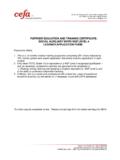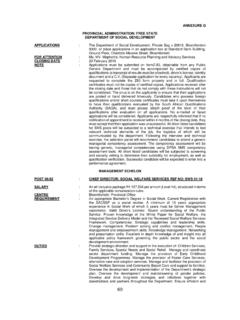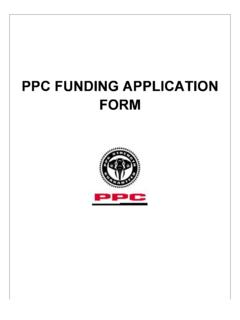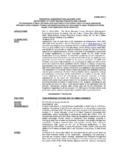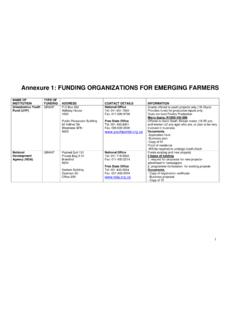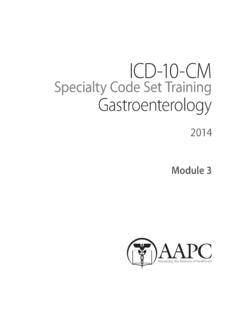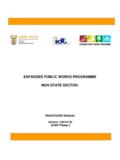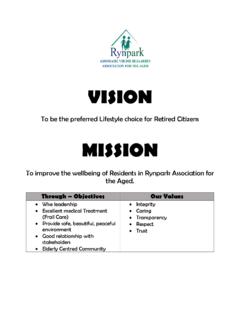Transcription of SOCIAL AUXILIARY WORKER TRAINING INFORMATION …
1 SOCIAL AUXILIARY WORKER TRAINING . INFORMATION letter TO LEARNERS. CEFA is an accredited TRAINING Provider for the Health and Welfare Sector Education and TRAINING Authority (HWSETA) and is registered with the Department of Higher Education and TRAINING (DHET), the Qualities Council for Trades and Occupations (QCTO) and all CEFA TRAINING programmes are registered with the South African Qualifications Authority (SAQA) and UMALUSI. Once accepted as a learner at CEFA, you will also be registered as a learner SOCIAL AUXILIARY WORKER with the South African Council for SOCIAL Service Professions (SACSSP).
2 1. MINIMUM REQUIREMENTS FOR REGISTRATION. Learners in possession of a pass in Grade 10, 11 or 12 Certificate can register, providing that their application has been approved by the CEFA Selection Committee. Please note only an end of year (final term) passed school report will be accepted. ABET Level 4, Subject Certificates, etc. do not meet the minimum requirements. You will be notified of the outcome of your application after scrutiny and processing by the regularly scheduled Selection Committee meeting. You need to volunteer or be employed at a welfare organisation where you will work under guidance of a registered SOCIAL WORKER for the duration of this course.
3 2. DURATION OF PROGRAMME. The TRAINING period for the qualification is 12 months. This is a full time course. After completion of all the theoretical and practical requirements of the qualification, the programme is subject to moderation, verification and certification, which may take a further two (2) to six (6) months, and is subject to the HWSETA approval. 3. CREDITS. 180 credits (1800 notional hours) at NQF level 4. 4. MEDIUM OF INSTRUCTION. English. 5. HOW TO APPLY. Complete the application forms (see attached copy) or which can also be obtained from our offices or from our website Payments can be made electronically and/or by bank deposit/s.
4 Please see & 9 for banking details. The original deposit slip/s (where relevant) must be sent with your application form. Please keep a copy of the slip/s for your own reference. By signing your application form you declare that you have read and understood the terms and conditions of CEFA for this programme. 6. IMPORTANT DATES. Due date for application: 14 November 2014. Registration fee due: 14 November 2014. Registration date: 12 January 2015. Registration day & Programme starts: 12 January 2015. 2. 7. PROGRAMME COSTS. Total cost of the programme: R18 320.
5 This includes programme TRAINING material. Please refer to the Fees Schedule on p. 11. Deposit of R5500 is included in total cost and is payable before learner start programme. According to CEFA Policy, this deposit covers Cycle 1 expenses (including venue cost, facilitator cost, material cost, as well as courier of material) and is not refundable on termination of studies during Cycle 1. 8. WHAT DOES THE PROGRAMME LOOK LIKE? The TRAINING programme consists of: Theoretical TRAINING (30% of the TRAINING programme). Practical workplace (70% of the TRAINING programme) TRAINING at an approved welfare organisation NGO's, NPO's, DSD, FBO, DOH, DOE.
6 MODULES IN THE SOCIAL AUXILIARY WORK. The scope of this TRAINING will focus on the following modules: No Title Credits 1 The South African SOCIAL Welfare Context 11. 2 Human Behaviour and Problems 34. 3 Judicial System 8. 4 Communication 40. 5 Research 19. 6 Report Writing 4. 7 Intervention Strategies 53. 8 Project Management 3. 9 Community Development 8. 180. Registration and orientation will take four days. The Schedule of Learning (SoL) will indicate the dates and duration of the theoretical TRAINING as well as the mentor orientation. Theoretical TRAINING is compulsory.
7 Every cycle consists of three modules. The learner will spend two consecutive weeks per cycle attending the theoretical TRAINING (see SoL). Practical workplace TRAINING is compulsory; workplace TRAINING takes 11 - 13 weeks per cycle (see SoL). The learner attend the workplace for five full days a week to do workplace TRAINING on how to work with individuals, families, groups and communities under the active involvement, guidance and control of a registered SOCIAL WORKER who will act as a Mentor. Assignments: For each module the learner will have to complete 2 practical assignments and three workplace activities.
8 (See paragraph ). 9. ASSESSMENT IN THE SAW PROGRAMME. The assessment in this programme consists of theoretical examinations, practical assignments and a summative case study. You have to be competent (C) in all these areas of assessment to qualify for the SAW certificate. MM001 Info letter 3. EXAMINATIONS. Learners write an examination for each module at the end of each of the three cycles. After successfully completing all 3 cycles, a final end-of-programme examination (summative case study) is written. Learners, who are found not yet competent (NYC) in a module during the examination, will be given two additional opportunities to write a supplementary examination.
9 PRACTICAL ASSIGNMENTS. A learner must be competent (C) in all assignments. Where a learner is not yet competent (NYC), they will be granted two further opportunities. SUMMATIVE CASE STUDY. The Summative Case Study is the final end-of-programme examination which combines all the theoretical and practical aspects of the programme Learners who are found competent (C) in ALL three types of assessment will be able to apply for registration as a SOCIAL AUXILIARY WORKER with the SACSSP. 10. LEARNER SUPPORT. Your facilitator will be available during the compulsory theoretical sessions scheduled in your area.
10 You will learn under the guidance of your Mentor Friendly CEFA staff can be contacted telephonically or via e-mail. We trust that you will find this learning experience enriching and fulfilling. _____. Dr Karien Lubbe CHIEF EXECUTIVE OFFICER. MM001 Info letter 4. CHECKLIST: DOCUMENTS TO ACCOMPANY YOUR APPLICATION. In order to register you need to send us the following documentation. Please use this checklist to ensure that all the relevant documents reach our offices DOCUMENT Y N. 1. Completed Application Form. 2. Your own curriculum vitae (CV).
